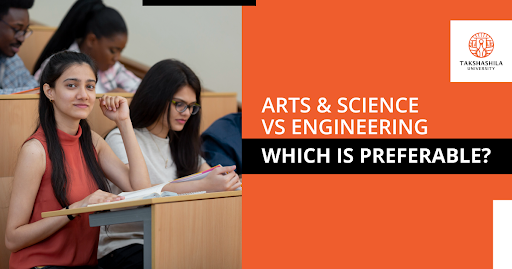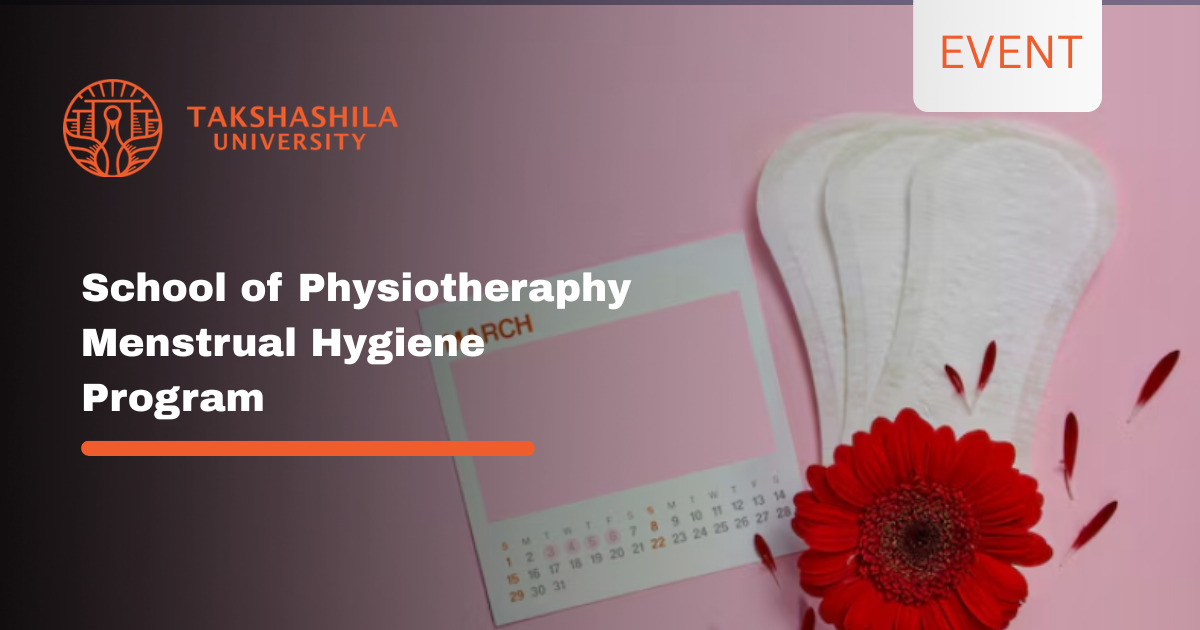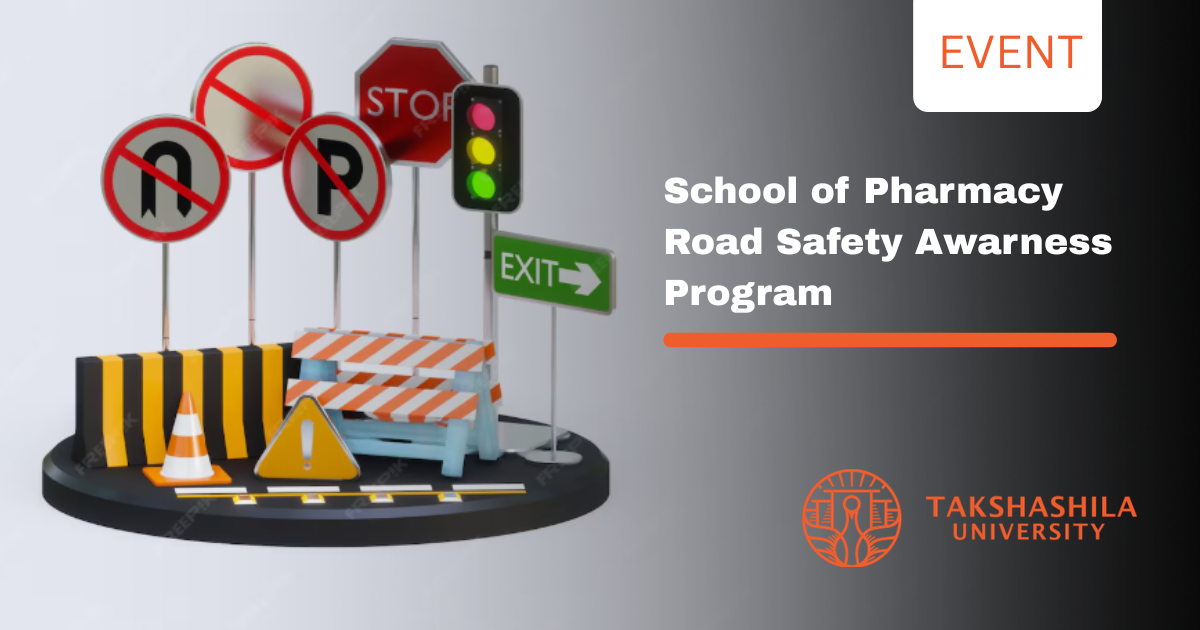Which is preferable in the career battle, Arts & Science Vs Engineering? We all know that these two fields are most students’ go-to options after 12th grade. But why are they so popular? Keep reading till the end to discover all the answers to your doubts.
Arts & Science And Engineering: Why Are They The Most Preferred Options By Students?
Would you believe it if we told you there are over 30,000 Arts and Sciences colleges and 3000 Engineering colleges in India? Yes, you heard it right!
There is even a report by the All India Council for Technical Education (AICTE) that 45% of students opt for Engineering, and the National Council of Educational Research and Training (NCERT) that 60% opt for Arts and Sciences after their 12th grades.
But why is that much craze? It is because they have diverse career paths, are in demand across industries, offer global opportunities, and provide competitive salaries.
If you want to pursue cutting-edge Engineering or innovative Arts and Science courses, choose Takshashila University for immense success.
Arts & Science Vs Engineering: The Differences
The dissimilarities between Arts and Sciences and Engineering are in the tabular column below for your understanding.
| Aspect | Arts & Science | Engineering |
| Focus | It focuses on creative expression, critical thinking and understanding human behaviour and culture. | It focuses on the practical application of scientific principles to create solutions for real-world challenges. |
| Curricula | The curriculum encompasses literature, history, sociology, psychology, anthropology, visual arts, music, and theatre. | The curriculum covers mathematics, physics, chemistry and specialised engineering courses. |
| Eligibility Criteria | A pass in 10+2 (or equivalent) in any stream (or with specific corresponding subjects) from a recognised educational board. | A pass in 10+2 (r equivalent) in the science stream (Physics, Chemistry and Mathematics) from a recognised educational board. |
| Methodology | It relies on qualitative research methods, such as data analysis and interpretation of human experiences. | It relies on quantitative analysis, experiments and problem-solving to innovate and implement solutions. |
| Tools and equipment | It uses writing instruments, paintbrushes, musical instruments and digital software for creative expression. | It uses tools like computer-aided design (CAD) software, 3D printers, measuring devices, lab equipment, etc., for testing and construction. |
| Career paths | It opens opportunities in writing, journalism, education, media, social work, research, and the arts industry. | It opens avenues to careers in civil engineering, mechanical engineering, software development, electrical engineering, aerospace, and a lot more. |
| Creativity and precision | It encourages creativity and imagination and fosters open-ended exploration. | It emphasises precision, accuracy and adherence to scientific principles for practical applications. |
| Work environment | Arts & Science graduates work in studios, classrooms, research labs, or freelance workshops. | Engineering graduates work in offices, laboratories, manufacturing plants, construction sites, etc. |
| Problem complexity | It tackles social, cultural and philosophical issues. | It addresses technological and practical challenges with innovative solutions. |
| Communication styles | It requires effective communication of ideas and concepts. | It requires effective technical communication for discussing specifications and project implementations. |
| Teamwork | It involves collaborative projects, discussions and group work. | It requires teamwork in various projects, where different engineering disciplines work together. |
| Ethical considerations | It deals with ethical dilemmas in human behaviour, society and culture. | It deals with ethical issues related to safety, technology use, etc. |
| Accreditations | Some careers may not require specific accreditation, and success is measured by creativity, skills and recognition in the field. | All careers usually require accreditation from engineering bodies for professional practice. |
| Cultural impact | It can influence the culture, values and societal norms. | It can influence the physical world with technical advancements. |
| Logical appeal | It appeals to emotions, senses and aesthetics. | Engineering focuses on functionality, efficiency, and logical design. |
| Audience | It engages with a broad audience, including the general public. | It addresses specific technical audiences and stakeholders. |
Both Arts and Science and Engineering fields contribute significantly to society by offering fulfilling and rewarding career opportunities. Keep reading to find the advantages and disadvantages of the same.
Pros And Cons Of Studying Arts & Science
Here’re the merits and demerits of studying Arts & Science.
Merits
- It provides opportunities for a wide range of exploration from literature, history and social sciences to artistic disciplines.
- It nurtures creativity and encourages self-expression.
- It provides broad career opportunities in the arts and media industries.
- It enhances critical thinking and creativity skills.
- It is intellectually stimulating and helps develop your understanding of yourself and the world around you.
Demerits
- The job market for Arts and Sciences is highly competitive.
- Since it’s highly competitive, it leads to a lack of job security.
- Also, the coursework can be challenging and requires more effort.

Pros And Cons Of Studying Engineering
Here’re the merits and demerits of studying Engineering.
Merits
- It provides diverse career opportunities in various fields, such as aerospace, civil, mechanical, electrical, biomedical, and more.
- With the advancements in technology and society, there is a growing demand for engineers with stable job prospects and potential career advancement.
- It provides global opportunities to work on projects.
- It is a rewarding career choice since it offers competitive salaries and benefits.
- Prestige and respect follow the degree, and the engineers are held in high regard for their expertise.
Demerits
- Engineering involves extensive use of mathematics and scientific principles.
- Engineers often have high pressure and responsibility.
- Engineers must stay up-to-date with emerging technologies throughout their careers to stay ahead of the crowd.

Explore The Arts & Science And Engineering Courses
Here’re some Arts & Science and Engineering courses for you to refer to and choose from.
Arts and Science
- B.Sc. Computer Science
- B.Sc. Chemistry
- B.Sc. Physics
- B.Sc. Bio-Technology
- BCA
- B.A. Economics
- B.A. English
- B.A. Psychology
- B.A. Tamil
- BSW
- B.Com. Accounting and Finance
- BBA Fintech and Digital Banking
Engineering
- B.Tech. Computer Science Engineering
- B.Tech. Artificial Intelligence & Data Science
- B.Tech. Information Technology
- B.Tech. Electronics & Communication Engineering
- B.Tech CSE (Artificial Intelligence & Machine Learning)
- B.Tech. CSE (Cyber Security)
- B.Tech. CSE (Block Chain)
- B.Tech. CSE (Internet of Things)
- B.Tech Computer Science & Business Systems
- B.Tech. Computer and Communication Engineering
You can enrol in these courses and explore a lot more at Takshashila University.
How To Make An Informed Decision?
The expert faculties from Takshashila University give you a checklist for deciding between Arts & Science and Engineering.
1. Interests And Passion
- Do you enjoy problem-solving? (Engineering)
- Do you prefer creative expression? (Arts & Science)
2. Strengths And Skills
- Do you like Maths and Science subjects? (Engineering)
- Do you like writing, critical thinking and analysis? (Arts & Science)
3. Approach
- Do you like a more structured approach? (Engineering)
- Do you like a more creative and flexible approach? (Arts & Science)
4. Learning methods
- Do you enjoy hands-on projects and working with tools and technology? (Engineering)
- Do you prefer research and theoretical work? (Arts & Science)
You can choose the best that aligns with your long-term career aspirations and evaluating the curriculum that excites you more.
Choose Takshashila University For A Successful Career!
Takshashila University, a prestigious Indian university, should be your first choice for Allied Health Sciences degrees. The wide range of courses and an excellent infrastructure make it a great place to begin your career.
The university’s departments are engineering, arts and sciences, allied health sciences, hotel management, physiotherapy, and agricultural sciences. It consists of 64 disciplines and encompasses 150 acres of land. Its academic and sports scholarships enable students to pursue their goals despite financial limitations.
The university ensures all graduates get employed in campus placement. Hands-on learning provides students with transferable abilities that enable them to shine in interviews and get hired by prospective employers.
Experienced faculty members prepare students for real-world scenarios by strengthening their leadership and problem-solving abilities.
Final Thoughts
The Arts & Science Vs Engineering discussion reveals that both are equally valuable and distinctive paths. They both shape the future foster progress, and contribute to the betterment of humanity. Choosing between them depends on the individual’s interests and career aspirations.
Frequently Asked Questions (FAQs)
1. Is Art & Science easier than Engineering?
Since Arts & Science involve more subjective evaluations, creative expression, and critical thinking, individuals find it less challenging than Engineering. The latter often demands solid mathematics and technical skills.
2. What are the benefits of Arts and Sciences?
Arts & Science courses provide a well-rounded education that makes the students understand human culture, history, social dynamics and scientific principles. It cultivates versatile skills among individuals that are applicable across various industries and professions.
3. Does Engineering have a scope?
As technology continues to evolve, the demand for engineers is also on the rise. They play a vital role in designing and developing solutions, addressing challenges and driving society’s progress.
4. Which course is best in Arts & Science?
The selection of course depends on one’s interests, skills and career goals. However, courses like computer science, psychology, economics, etc., are evergreen.
5. Does Arts and Sciences have a scope?
Since Arts and Sciences are interdisciplinary in nature, it has a significant scope in today’s world.






